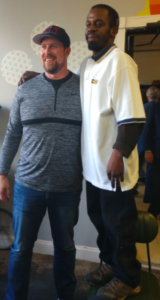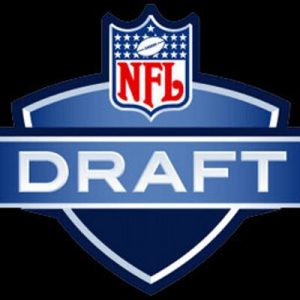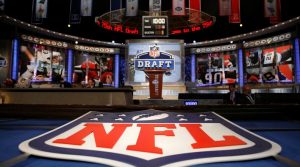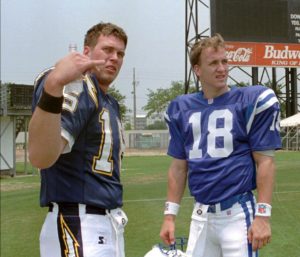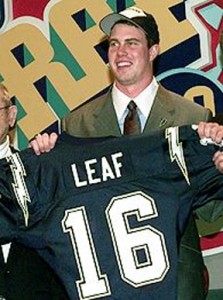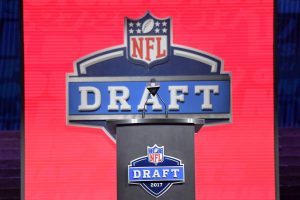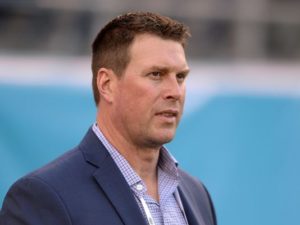Given a. it’s NFL Draft night and b. the opioids epidemic that is currently gripping America, we now re-publish this piece from November 2, 2018, and our Ryan Leaf exclusive from November 29, 2018.
In the first college football game I attended as a student, the visiting team scored an 80-yard touchdown pass on the very first play from scrimmage.
The visitors, Washington State, would go on to win and play in the Rose Bowl against that year’s eventual national champions, Michigan. The home team, my alma mater of Illinois, wouldn’t even win a single game that year.
More than 20 years later, I’m sitting in a Cadillac Escalade, rolling down Chicago’s Michigan Avenue and the quarterback who threw that 80-yard TD pass, Ryan Leaf, is now granting me an exclusive interview; and the topic of football is ancillary to the purpose of our discourse.
This exclusive takes place after I had just watched Leaf give a speech to Above and Beyond Family Recovery Center in the East Garfield Park neighborhood of Chicago. A few hours later, I’ll witness his giving a longer, more detailed, version of that speech again at Above and Beyond’s Second Annual Gala at the Drake Hotel in Chicago’s Gold Coast neighborhood.
The unexpected twists and turns on the road of life, the small choices that eventually have tremendous consequence on our direction towards certain moments in our lives was a theme omnipresent in these speeches.
“I have an unbelievable life that has nothing to do with football,” the Great Falls Montana native said towards the end of his speech to Above and Beyond, a nonprofit center founded and funded by businessman Bryan Cressey (You can find more information on Above and Beyond online here).
“I have a one year old baby boy at home, a beautiful fiancé, and a family and a community that supports me not because I was a great athlete- that was the furthest thing from the truth. It’s because I became a flawed human being trying to be better, every day, just like every one of you.”
While we did discuss Notre Dame’s College Football Playoff chances (read his take at this link) and the playoff chances for Michigan and the Big Ten, the actual meat and potatoes of our Q&A revolves around topics that are infinitely more serious and meaningful than the gridiron.
Ryan Leaf is currently the Program Ambassador for Transcend Recovery Community and Chair of FIF (Focused Intensity Foundation). He’s a leading advocate for the recovery community, and he travels all across the country giving inspirational speeches like the two that I heard on this specific Friday. His mission is to reach and inspire addicts, and help them on along the road to recovery.
He’s been there himself having overcome an eight year struggle with prescription painkillers. Leaf’s addiction was so severe that it led to a considerable amount of criminal behavior, and finally a burglary that sent him to jail for 32 months.
Because of his celebrity status as a former NFL starting quarterback and Heisman Trophy finalist, his criminal exploits garnered a lot of national media coverage.
A big part of his recovery was achieved by implementing Rational Emotive Behavior Therapy, the pioneering form of cognitive behavior therapy developed by Dr. Albert Ellis in 1955 and strongly advocated at Above and Beyond.
“Even though I was getting negative attention for it, for somebody who is a narcissist, at least somebody cared,” he said during his speech.
“Because the police kept showing up.”
These days Ryan Leaf shares his story of dealing with mental health issues and substance abuse, and he’s striving to eliminate the stigmas that accompany both of these afflictions.
I began the Ryan Leaf Q&A by asking him what do you say to the addict that says “I can quit any time if I want to.”
“I got a great answer for that- then do it,” he responded.
Audio of our podcast, “Let’s Get Weird, Sports” on SB Nation’s Hammer and Rails Network, covering Ryan Leaf is below:
“I don’t have a drinking problem, then how about we just quit for a year. Try it out.”
“Since it’s not a problem, then go to it and you’ll know you can do it, and there’s no response to it. Either they acquiesce to it, or they continue on their path. Until somebody is ready to change, you can’t change for them.”
Although the situation is obviously very different for every individual, what is the key to helping a person take ownership of their situation and finally have that important self-realization and awakening?
“It has to be their bottom, whatever that is,” Leaf answered.
“For me, I was such a narcissist that I had to be humbled in a way that I ended up on a prison cell floor.”
“My hope is, the only thing I can control is, to tell my story and that somebody who hears it, who’s going through something similar to what I went through knows that there is a solution and a way out; and will take it, but like I said, I can’t do it for ’em.”
I then followed up for further clarification on what rock bottom truly is.
“Your rock bottom, whatever that is. Mine had to be in a prison cell I guess. Where somebody else’s might be having to be confronted by an employer. That’s their rock bottom. It’s important that people who unconditionally care about them stop enabling it and hold them accountable for their actions, and sometimes that’s enough.”
“Unfortunately, sometimes the rock bottom ends up being really the bottom where they die- that’s the part that keeps driving me.”
“I don’t want anybody else to die from this disease, because of lack of information or stigma.”
When asked about what role denial can play in obstructing addicts from reaching recovery, Leaf says that was not an issue in his particular case.
“I looked at myself in the mirror every night and was like ‘you junkie; you just need so much help.’ I just wasn’t willing to ask for it. I liked feeling high, I liked that feeling of not knowing that I’m a junkie and the way to do that is to medicate myself, to make myself numb and to not feel anything.”
“And I think a lot of people self-medicate that way, because they feel like a loser or depressed, and they chose to numb that away instead of to deal with that in a positive way.”
What an honor to meet you. Thank you for being part of the solution. Enjoy retirement!! https://t.co/YCOaFKiIij
— Ryan D Leaf (@RyanDLeaf) November 3, 2018
Leaf makes it known right off the bat in his speeches that he is not a product of his environment.
He was raised by two loving parents, in a privileged white middle class background.
He was put on a pedestal in his hometown due to his athletic prowess, and at age 21 was handed 31 million dollars (which he likened to handing a 13-year-old that egregiously exorbitant amount of money).
When Ryan Leaf completed his final season of college football he was part of a Heisman Trophy finalist grouping that consisted of himself, Randy Moss, Charles Woodson and Peyton Manning. The other three men in that group are among the top five or top ten to ever play their respective positions in the NFL.
When he entered the National Football League in 1998, the talking heads debated incessantly whether or not the first overall pick should be Leaf or Manning.
Leaf, taken second overall by the San Diego Chargers, finished his NFL career having seen action in just three seasons, two with San Diego, one with Dallas. He won just four games as a starter. When the Chargers cut him in 2001, he learned about it via a newspaper article while on his honeymoon.
He retired from football at age 26 with the following statistics:
48.4% completion percentage, 14 TD passes, 36 interceptions, 3,666 yards passing and a passer rating of just 50.0. Manning, selected first overall by the Indianapolis Colts, holds many NFL records, including touchdown passes (539), AP MVP awards (5), Pro Bowl appearances (14), 4,000-yard passing seasons (14), single-season passing yards (5,477 in 2013), single-season passing touchdowns (55 in 2013), and is second in career passing yards (71,940).
He was number one in that final category until just a few weeks ago, when he was surpassed by Drew Brees.
We make this juxtaposition in the hopes that others will stop doing it in the future and eventually it starts to dissipate. For the past 15-20 years, the quarterback you compare Manning to is not Leaf, but Tom Brady.
Leaf did say in his speech at The Drake how every April, during NFL Draft season, he has to hear the NFL pundits talk about not drafting “the next Ryan Leaf,” though he also said:
“I must have been pretty damn good if I was considered one of the biggest busts of all time.”
The Washington State Cougars legend says that he was known to many people, for a very long time, by the viral video of him that came about before viral videos on the internet were even a thing.
It’s the footage of him blowing up at a reporter in such an extreme manner that he needed to be restrained by teammates.
Throughout his career he had an extremely adversarial relationship with the media, but today he IS IN THE media. (Again funny how the road of life takes you on these unexpected twists and turns).
Ryan Leaf, like the NFL team he’s synonymous with, has now moved to L.A. where he currently hosts “PAC-12 This Morning” on SiriusXM 373, Monday-Friday 7-10 AM PT. He also does television analyst work for PAC-12 Network.
He is, for lack of a better word, very much an individual brand again.
He says during his speeches that there’s a reason he’s still here, because he was after all: “breaking into homes in the state of Montana, where everyone has a gun.”
He has a job that most readers of this site would consider a dream. He also has an aforementioned child and a wife to be.
The most important thing he has right now is purpose, and that is considerably more meaningful than any football achievement, victory, statistic or record.
NFL Draft Stock Profiles
Devon Witherspoon Chase & Sydney Brown Jartavius Martin Peter Skoronski C.J. Stroud Jaxon Smith-Njigba
Paul M. Banks is the owner/manager of The Sports Bank. He’s also the author of “Transatlantic Passage: How the English Premier League Redefined Soccer in America,” and “No, I Can’t Get You Free Tickets: Lessons Learned From a Life in the Sports Media Industry.”
He’s written for numerous publications, including the New York Daily News, Sports Illustrated and the Chicago Tribune. He regularly appears on NTD News and WGN News Now. Follow the website on Twitter and Instagram.

